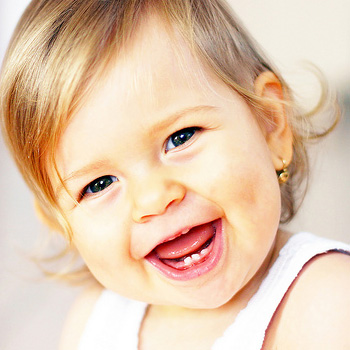Dental Care for Your Baby
Congratulations on the arrival of your baby! Are you prepared for the arrival of your baby's first tooth? Follow these guidelines and your son or daughter will be on the way to a lifetime of healthy smiles!
Caring for Gums
Even before your baby's first tooth appears, the gums can benefit from your careful attention. After breast- or bottle-feeding, wrap one finger with a clean, damp washcloth or piece of gauze and gently rub it across your baby's gum tissue. This practice both clears your little one's mouth of any fragments of food and begins the process for building good daily oral care habits.
Baby's First Tooth
Baby teeth can come in easy or a little more tougher. Remember to support your child through this process. Some helpful tips to help sooth the teething pain are the following:
- place the pacifier or a favorite soft toy in the refrigirater or frizer for couple of minutes and give it to the baby. Anything that's cold will calm the pain and soothe the gums.
- place a piece of soft banana, peach, mango etc in the frizer and then smash it into a puree for your baby
-massage the gums when brushing in the morning and at night
-whenever fever is present consult with your pediatrician to give your child age appropiate Tylenol or Motrin.
In very rare occasions teeth come accompanied by an eruption cyst. An eruption cyst it's a bump full of liquids that has different colors ranging from pink to red to dark purple that grows instead of a tooth. Normally the tooth will take longer to come out and treatment is not recommended. If pain or infection is present contact us to check it out.
When that first tooth makes an entrance, it's time to upgrade to a baby toothbrush and make your first appointment with a pediatric dentist. We recommend the first dental visit as soon as the first baby teeth show up.
There are usually two options: a long-handled toothbrush that you and your baby can hold at the same time, and a finger-puppet-like brush that fits over the tip of your pointer finger. In each case, the bristles are soft and few.
At this stage, toothpaste isn't necessary; just dip the brush in water before brushing. If your little one doesn't react well to the introduction of a toothbrush, don't give up. Switch back to a damp washcloth for a few months and try the toothbrush again. During the teething process, your child will want to chew on just about anything, and a baby toothbrush with a teether can become a favorite toy during this period.
Brushing with Toothpaste
When a few more teeth appear, you can start using toothpaste with your child's brush. However, for the first two years, be sure to choose toothpaste that does not contain fluoride, unless advised to do so by your dentist, because too much fluoride can be dangerous for youngsters. At this stage, use only a tiny amount of toothpaste. Pea size. From the beginning, have your little one practice spitting the toothpaste out after brushing to prepare for fluoride toothpaste, which should not be swallowed at any age.
www.madebydocs.com
Avoiding Cavities
Don't give your baby any sort of sweetened liquids such as flavored drinks or soda. Even the sugars present in fruit juice, formula, and milk (this goes for breast milk as well) can cause decay, so regular teeth and gum cleaning is vital. Also, make sure your baby never goes to bed with a bottle; sugary liquids in prolonged contact with teeth are a guarantee for early-childhood decay, also called baby-bottle caries.
First Visit to the Dentist
It's recommended that you bring your baby in for a visit within six months of the first tooth's eruption – usually around his or her first birthday. Since decay can occur in even the smallest of teeth, the earlier your baby visits us, the more likely he or she is to avoid problems. We'll look for any signs of early problems with your baby's oral heath, and check in with you about the best way to care for your little one's teeth. Remember that preparing for each dental visit with a positive attitude goes a long way toward making your child comfortable with regular checkups.
Setting a Good Example
As part of the natural learning process, little ones are expert mimics, and you can take advantage of this talent. Brush and floss daily while your child is watching, and he or she will intuit at an early age the importance of your good habits. As soon as your child shows interest, offer a toothbrush of his or her own and encourage your toddler to “brush” with you. (You'll find toothbrushes with chunky, short handles that are easy to grip.) Most children don't have the dexterity necessary to thoroughly clean their own teeth until they're about six or seven, so you'll have to do that part of the job. Try different tactics to make brushing fun: flavored toothpaste, a toothbrush with a favorite character on it, or singing songs about brushing. The primary goal is to instill healthy oral habits at an early age to set your child up for a lifetime of healthy, cavity-free teeth!


 Website Powered by Sesame 24-7™
Website Powered by Sesame 24-7™